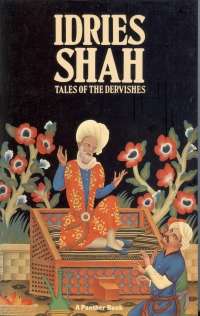Tales of the Dervishes
 | |
| Author | Idries Shah |
|---|---|
| Country | United Kingdom |
| Language | English |
| Genre | Eastern philosophy and culture |
Publication date | 1967 |
| Media type | Print (Hardback & Paperback) |
| ISBN | 0-553-80523-1 |
Tales of the Dervishes was first published in 1967. Together with The Exploits of Mulla Nasrudin, published the year before, it represented the first of several books of practical Sufi instructional materials to be released by Idries Shah.
Shortly before he died, Shah stated that his books form a complete course that could fulfil the function he had fulfilled while alive. As such, Tales of the Dervishes can be read as part of a whole course of study.[1]
Summary
Tales of the Dervishes is a collection of stories, parables, legends and fables gathered from classical Sufi texts and oral sources spanning a period from the 7th to the 20th centuries. It introduced a 'genre' – the teaching story – to a contemporary readership familiar with the entertainment or moralistic values of such tales but unfamiliar with certain instrumental functions claimed for them. An author's postscript to each story offers a brief account of its provenance, use and place in Sufi tradition.
Reception
The Islamic scholar James Kritzeck, reviewing Shah's Tales of the Dervishes in The Nation, said that it was "beautifully translated" and equipped "men and women to make good use of their lives."[2] The Stanford University professor Robert E. Ornstein, writing in Psychology Today, called the book "... a collection of diamonds ... incredibly well-crafted, multifaceted ... likely to endure in the manner of the Koran and the Bible."[3] The Observer noted that the book "... challenges our intellectual assumptions at almost every point."[3] Desmond Morris, in The World of Books (BBC), said that "For every decade we live, we will find another meaning in each story."[3] The Sunday Times called it "An astonishingly generous and liberating book ... strikingly appropriate for our time and situation ... a jewel flung in the market-place."[3]
Philosopher of science and physicist Henri Bortoft used teaching tales from Shah's corpus as analogies of the habits of mind which prevented people from grasping the scientific method of Johann Wolfgang von Goethe. Bortoft's The Wholeness of Nature: Goethe's Way of Science includes stories from Tales of the Dervishes, The Exploits of the Incomparable Mullah Nasruddin and A Perfumed Scorpion.
References
- ↑ Shah, Tahir (2008). In Arabian Nights: A Caravan of Moroccan Dreams. New York, NY: Bantam. pp. 215–216. ISBN 0-553-80523-1.
- ↑ Lessing, Doris; Elwell-Sutton, L. P. (1970-10-22). "Letter to the Editors by Doris Lessing, with a reply by L. P. Elwell-Sutton". The New York Review of Books. Retrieved 2008-11-05.
- 1 2 3 4 Tales of the Dervishes: Editorial Reviews on amazon.com